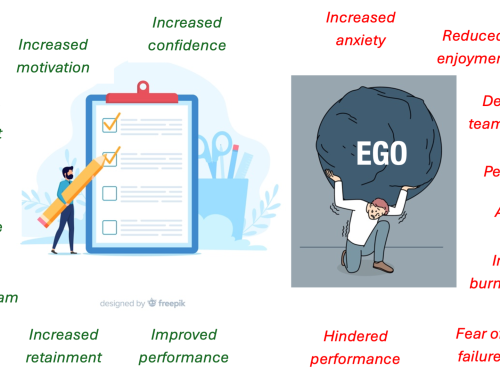A managerial change can be a seismic event for players, fans, and the club’s overall atmosphere. The transition can present significant challenges for all those in the environment, specifically the players – uncertainty around their playing time and future at the club, concerns around the new staff and their style of play, the impact on team cohesion, and performance consistency. So, why don’t we delve into some of the challenges that the incoming coach and the players may experience? In doing so, we can build our knowledge of what may help or hinder both players and coaches through a manager change, expected or otherwise, and how we can reduce the impact across the whole team environment.
Issue 1 – Disruption of Routine and Stability
Challenge
Footballers thrive on routines. From their daily training schedules to pre-game routines which they rely upon every time they are about to perform, a footballer falls back upon some type of routine every day. A new manager often brings a new style, philosophy, and regimen, which disrupts players’ familiar and established routines. The process which they always fall back on is now no longer possible, which can be troublesome when a routine provides a player with a sense of structure and control over their daily life. This disruption can increase anxiety and create uncertainty, particularly if the new approach contrasts sharply with the previous one.
Psychological Insight
Routine provides athletes with a sense of security and control, which is essential for readying oneself for peak performance. A routine provides the opportunity to ready yourself in a consistent way before performing, and when something disrupts this stability, it can lead to a temporary decline in performance as players adjust.
Strategy
Encouraging players to focus on controllables—like personal training efforts, preparation, and goals—can help them maintain a sense of stability despite changes around them.
Issue 2 – Adjustment to New Demands and Roles
Challenge
A new manager often introduces new tactical systems, which requires players to adapt their style or even learn new positions. This can challenge players’ confidence and create room for self-doubt if they feel unfit or unprepared for the new role.
Psychological Insight
Confidence is closely tied to familiarity in your role and success in fulfilling the requirements of your role. If players feel they are being set up to fail in a new system, it can lead to frustration, self-doubt, and decreased motivation.
Strategy
Open communication between the manager and players is crucial. If players understand the reasoning behind new tactical approaches and feel supported in their transition, they’re more likely to embrace changes with a positive mindset. Adapting is a part of football, but if you are the new coach, how you support your players through the process tends to be more important in how it’s received.
Issue 3 – Loss of Trust and Bond with Former Manager
Challenge
It’s natural for players and staff to form close bonds with their managers, coaches, and support staff, particularly if the previous manager was a source of support or inspiration. Losing a trusted leader can feel like a personal loss, leaving players feeling adrift and uncertain of what lies ahead.
Psychological Insight
Trust is a fundamental aspect of team cohesion, and when players lose a manager they’ve trusted, it can essentially lead to a period of mourning. This emotional transition is similar to other types of loss and requires time to process, especially when a manager has left on their own, ‘good’ terms – think Jurgen Klopp as opposed to a manager who has been sacked.
Strategy
From the new manager’s perspective, building rapport should be seen as a priority to a successful start to life at their new club. Building rapport quickly can help the new manager establish trust and ease players into the change. For players, especially the leaders within the playing group, seeking opportunities for players to discuss their feelings about the change, whether in team meetings or individual sessions, can help facilitate this transition. However, in the world of professional football, more often than not these changes come after a period of frustration and can be welcome by some within the environment. However, we should keep in mind that this isn’t always the case, and knowing how to navigate a beloved manager leaving a club is important to coping with the transition.
Issue 4 – Performance Pressure and Immediate Results
Challenge
Clubs often change managers to achieve immediate improvement, which puts immense pressure on players to deliver results, usually to avoid financial penalties – e.g., relegation or missing out on qualification through final table standing (e.g., top 4). This pressure can create further stress and anxiety at an already emotionally charged time.
Psychological Insight
The expectation for immediate results can cause players to overthink their performance, leading to hesitancy and mistakes. The pressure to perform under a new manager may result in fatigue, mental and physical, and reduce players’ enjoyment of the game.
Strategy
Focusing on incremental progress and celebrating small victories can relieve some of this pressure. Try to compliment outcome goals (“we need 7 points to stay up”, “I need 4 goals in 5 games”, etc) with process goals (“Complete 500m of high-speed running in the next game”, “Finish each training session this week with some shooting practice”, etc) where possible. If players can shift their mindset from winning at all costs to improving each game, they’re more likely to perform freely and with confidence.
Issue 5 – Team Dynamics and the “Survival” Mentality
Challenge
A change of regime can lead to some players feeling their position is at risk. “Will I be replaced?”, “Will the new manager like me?”, “What happens if I can’t prove to the new manager why I should be starting?” are common questions a player may have. This fear can create a competitive, individualistic mentality as players attempt to secure their roles, damaging team unity.
Psychological Insight
A “survival” mentality can lead players to prioritise personal goals over the team’s objectives, which weakens cohesion and damages the collective effort on the field.
Strategy
To prevent a fractured team environment, the new manager may look to establish a culture of fairness and clear communication around selection criteria. Encouraging a growth mindset—where players see improvement, rather than survival, as their main goal—can help maintain unity and team morale.
Issue 6 – Resistance to Change and Lack of Buy-In
Challenge
Some players may resist the new manager’s style or tactics, particularly if they were close to the previous manager or if they disagree with the new approach. This resistance can result in passive disobedience, decreased effort, and ultimately conflict within the team.
Psychological Insight
Resistance to change is common in any environment, let alone high-pressure environments. While the majority of players will be professional, some players may struggle to “buy into” a new system until they see its value or relevance to their success.
Strategy
Building buy-in is crucial, and the manager can achieve this by involving players in discussions about team goals, values, and roles. If players feel ownership over their roles in the new system, they’re more likely to support it.
Issue 7 – Adjustment Period and Patience with Transition
Challenge
The time needed to adjust to a new manager’s approach may not align with the club’s expectations for quick results. This adjustment period can be physically and mentally exhausting for not just players but other support staff as they try to meet new expectations while under pressure.
Psychological Insight
Transition periods are mentally demanding, as they require players to simultaneously let go of old habits and learn new ones. This process can result in a temporary performance dip that is often mistaken for a lack of talent or effort.
Strategy
Clubs, or senior stakeholders within the performance environment, should encourage a positive, growth-oriented culture to help players manage the stress of change. Additionally, setting realistic short-term goals and celebrating milestones can help players and staff feel a sense of progress. I’d even advocate for the provision of mental health support during transitions as a greater level of support for players and staff alike.
Conclusion
Changing coaching staff is often necessary in high-performance environments, but it’s a challenging process that requires attention to players and staff alike in their mental and emotional wellbeing. By anticipating and addressing the challenges that come with managerial transitions, clubs can foster a resilient and adaptable team culture which will help support the ambitions of the club and the transition process. With open communication, supportive coaching, and a focus on building trust, all those within the environment can navigate these transitions more effectively, ultimately leading to a stronger and more cohesive team.





Leave A Comment